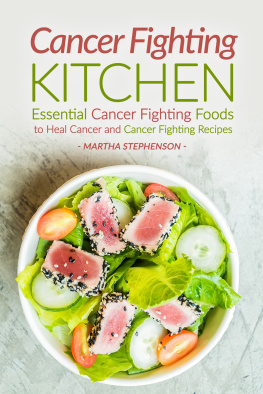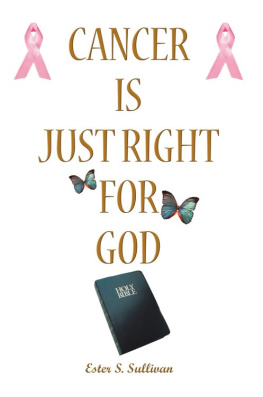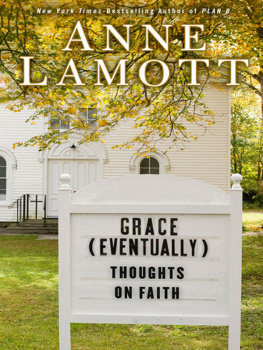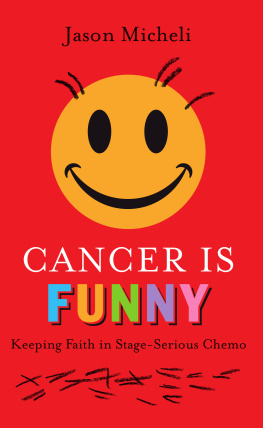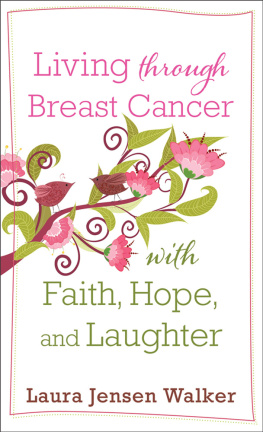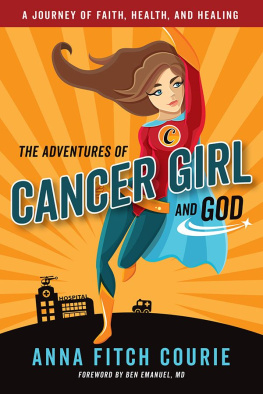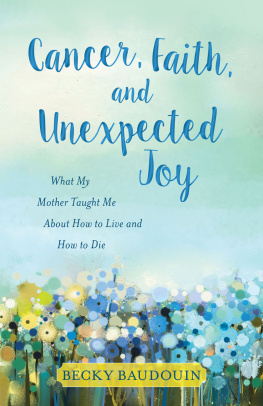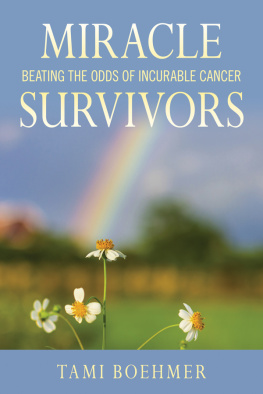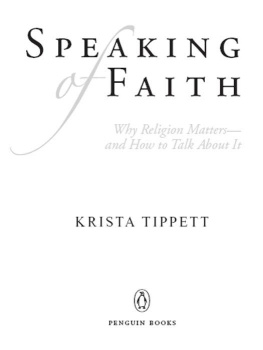Preface
G etting paid to talk about God is a pretty sweet deal. As a religion professor, I spend my days talkingout loud and on paperabout the really big questions of life. My conversation partners, whether they are students, church members, friends, or family, are living those questions, sorting through inheritances, exploring the gaps, striving to be faithful to what they believe to be true. This profession of mine affords me the privilege of getting to talk about God in ways that are always informed by the questions, claims and wagers of others.
Then cancer came along and interrupted the conversation.
As an expert talker, I suddenly was no expert at all. A novice with a cancer story different from any other I knew. Breast cancer was the diagnosis, but my narrative didnt include finding a lump, removing a breast or losing any hair. A broken back triggered the stage IV cancer diagnosis and a lousy prognosis: five years out, eighty percent of those who have what I have are dead. My lack of expertise, unfamiliarity with the journey, and fear of what lay ahead conspired against me. Cancer left me tongue-tied, groping for words.
This is a story about cancer and what it steals from rich, full human lives. But the heart of this story is not really about cancer at all: its about the real-life communion of saints and the incarnation of divine love that ushers salvation into the midst of the wretchedness. This is a story of amazing grace, mediated through prayers of children, hands of family, feet of friends, gifts of strangers. Its a story of acceptance of the grace that is rather than the grace that could be .
This story takes place in the Minnesota neighborhoods, hospital rooms, bedrooms, classrooms, and sanctuaries where I live, love, teach, worship, and pray. It is in those spacesaccompanied by those who incarnate the hands and feet of divine lovewhere I grieve what is lost and slowly embrace what is not. As words return and I learn to talk about cancer while talking about faith, the conversation pushes beyond the predictable parameters of prayer, the church, even hope in life after death.
Refracted through the lens of cancer, my life as wife, mother, daughter, sister, friend, and professor looks very different than it did before cancer. Refracted through the lens of cancer, faith looks different too.
Through the telling of this story of life and faith with stage IV cancer, I hope to offer what I wish I had had: a story about talking faith in the midst of cancer and talking cancer in light of faith; a way of speaking that resists conventional language about Gods relationship to suffering, particularly in its cancerous form. The story that follows is no sentimental God saved me from cancer tale; instead its an accounting of faiths faltering speech in the face of grim prognoses and brief glimpses of hope.
No doubt about it: cancer has changed virtually every aspect of my life. One thing that hasnt changed, however, is my understanding of myself as more sinner than saint. In public talk about cancer, theres a temptation to cloak cancer patients with a disease-induced righteousness. Or to suggest that those of us suffering from cancer possess a saint-like status that separates us from those who are cancer-free. But experience tells me that even though Ive suffered much from cancereven though I have undergone significant character adjustments because of the cancersainthood remains elusive, out of reach.
The fact that Im still a sinner is precisely why Im stuck on hope. As a person who never quite gets it right, Im always hoping for more in this lifemore chances to be gracious, kind, loving. Beyond these basic hopes, new hopes for this life have become important, too: hope for continued inactivity of the cancer in my body and in the bodies of so many others, for psychological and spiritual courage to live with this disease, for the gift of living long enough to see my daughters grow into adulthood.
In addition to hoping for more in this life, I also hope for more beyond. I hope that the promises of God are true: that there is more to life beyond this earthly one; and that in that life beyond there will be no more crying, no more dying, only light, only love, only joy.
My movement from fracture to hope has been possible only through the awe-inspiring support of family, friends, coworkers, neighbors, medical professionals, and church communities. My gratitude extends far and wide, but most especially to the following individuals and groups of persons who have made living with cancer possible:
- to the exceptional physicians, nurses, technicians, and staff at Abbott Northwestern Hospital, its Radiation Oncology clinic, the Twin Cities Spine Center, and Minnesota Oncology, especially Dr. Margaret MacRae and Dr. Amir Mehbod for their lifesaving care;
- to the compassionate, caring staff and congregations of Gloria Dei Lutheran Church in Saint Paul, Minnesota; Hope Lutheran Church in West Des Moines, Iowa; and other communities of faith that have held me in prayerespecially to Gloria Dei parish nurse Mary Jo Hallberg for her expert care and loving friendship;
- to the fabulous faculty, staff, students and administrators at Hamline University and in the Department of Religion, especially Jenny Keil, Mark Berkson, Kris Deffenbacher, and Mike Reynolds;
- to the wonderful attorneys and staff at Dorsey LLP and its Health Group, especially Raquel Smith;
- to those dear friends who have walked with and for me, especially Cindy Kaus, Char Hess and John Baldwin;
- to all those who lovinglyand secretlystitched a quilt for us, especially Peggy Andrews, Jenny Keil, and Elaina Bleifield and families for their stunning work and friendship;
- to the community of parents from Horace Mann Elementary School, especially Eileen Moening and Kelly Trewartha, for the endless stream of meals and laundry service;
- to the teachers and administrators at Horace Mann Elementary and Capitol Hill Magnet School in Saint Paul, especially Kathy Ames, Amy Kordeum, and Doug Lewer for their attentive care of our daughters during an awful year in their lives;
- to our neighbors, especially the Polleis, Schoettlers, and Hanna-Kaplans for their steady gifts of food, snow shoveling, love and concern;
- to our friends near and far who have held us in prayer, sent notes, cards, jewelry, blankets, and blueberries, especially Lillian Daniel, Verity Jones, Kristen Looney, Karen Bastian, and Alzada Tipton for their friendship and special visits to St. Paul, and to Peter Nilsen-Goodin and Aaron Heley Lehman for their rock-solid support of Neal.
I am also indebted to those who read parts of this manuscript: Deborah Keenan, Mike Reynolds, John Baldwin, Maya Hanna, Rita Brock, Peggy Andrews, Lois Tverberg, Nicole Heley Lehman, Jenny Keil, Beth Gunderson, Michele Bassett, Dianne Oliver, Martin Copenhaver, Jim and Sonya Gindorff. Their feedback affirmed the importance of telling this story and deepened my ability to tell it. Special thanks also to Pam Fickenscher for the encouragement to begin writing, to Lillian Daniel for her guidance and inspiration throughout the writing process and to Mary (Joy) Philip for passing my proposal on to the publishers.
In this litany of gratitude, the best has been left for last. I would not have been able to hope for more without the support of my family: to my parents, Jackie and Merv Thompson, for their astounding love and care; to my parents-in-law, Erna and Glenn Peterson, for their abiding support and concern; to my brother, Noel, and sister-in-law, Ann, and family for their consistent care and for setting up the CaringBridge Site; to my sister- and brother-in-law, Naomi and David Tetzlaff and family for their support and guidance through the medical maze of hospitals, clinics, scans, and treatments; to my grandmother, aunts, uncles, and cousins for all their prayers and support.


